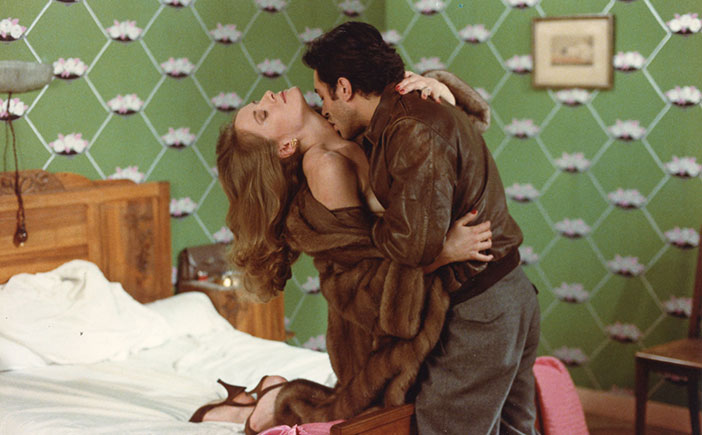By Armond White
Dominique Sanda, the androgynous siren of Bertolucci’s The Conformist and 1990, appears in Jacques Demy’s Une Chambre en Ville wearing a luxurious fur coat and nothing underneath. She trolls the streets of Paris to escape her confining marriage, looking for a way out–a room with a view to match that title’s metaphorical room in town. She’s carrying a suitcase like Blanche DuBois’ entrance in A Streetcar Named Desire, but Une Chambre (at Film Forum thru Oct. 5) is a Demy film, so Sanda, as the mysteriously wounded Edith, sings.
 Une Chambre en Ville was made towards the end of Demy’s career, after his 1964 masterpiece The Umbrellas of Cherbourg, a film that still illustrates the audacious brilliance of the French New Wave–the period that inspired the phrase “the heroic era of movie going” to describe audiences who responded to the most formally challenging (rather than mindlessly distracting) films. Demy’s innovation in Umbrellas connected cinema to the tradition of opera, but through its 20th century derivations, the operetta and its offshoot the movie musical. By not being an opera–Umbrellas definitively demonstrated the ecstasy of life being expressed through song.
Une Chambre en Ville was made towards the end of Demy’s career, after his 1964 masterpiece The Umbrellas of Cherbourg, a film that still illustrates the audacious brilliance of the French New Wave–the period that inspired the phrase “the heroic era of movie going” to describe audiences who responded to the most formally challenging (rather than mindlessly distracting) films. Demy’s innovation in Umbrellas connected cinema to the tradition of opera, but through its 20th century derivations, the operetta and its offshoot the movie musical. By not being an opera–Umbrellas definitively demonstrated the ecstasy of life being expressed through song.
Scholar Richard Dyer described the movie musical as a form in which characters sang and danced when regular speech and movement could no longer contain their emotions. Demy’s translation of common expression into song heightened the poignancy of taken-for-granted dailiness. His bold stylization captured the tenses of human experience and enhanced our appreciation for the spiritual longing of his characters.
Demy‘s visual design and vibrant use of color are part of Umbrella’s revolutionary innovation–taking Minnelli compositional elegance to a higher level of formalist precision into a new area of nearly surreal emotionality: The pleasure of movie-musicals was made visible, almost graspable, a taste one could savor aesthetically, spiritually.
This truly radical invention has not been surpassed, even though Umbrellas stands virtually alone as an original accomplishment–Ducastel and Martineau‘s Jeanne and the Perfect Guy paid tribute to it as do Christophe Honore‘s recent musical films such as Love Songs (its title, however, diminishes Demy’s linguistic daring). Yet. the most remarkable tribute was Demy’s own 1982 film Une Chambre en ville where he returned to the radicalism of Umbrellas with a sung-through drama that expressed life’s dark complications. The film’s pair of lovers, Francois (Richard Berry) and Edith (Dominque Sanda) meet during a city-wide labor strike; their romance is desperate, a response to life’s disappointments–(Francois’s disaffection with the innocent Violette (Fabienne Guyon), Edith’s mismatched marriage to Edmond (Michel Piccoli) and Edith’s widowed mother Margot (Danielle Darrieux) living among her regrets; she rents a room to the uprooted Francois (a Techine prototype).
In contrast to the discovery of life experience in Umbrellas, Une chambre reflects a politically changed world. It shares a contemporaneous attitude with the L.A. punk band X who, in 1980, recorded “The World’s a Mess, It’s in My Kiss.” Though not punk, Une chambre replaces Umbrella’s buoyancy with a plangency–partly due to the differences of Michel Colombier’s music score from Michel Legrand’s Umbrella’s score. (In the early 80s Legrand was preoccupied on Barbra Streisand’s Yentl.) Not quite opera, Une chambre suggests the romantic turmoil of one–specifically Bizet’s Carmen (which Godard would adapt into Prenom: Carmen in 1983). Like Bizet, Demy addresses the passions of urban disaffection yet his own vision—though not his sensibility—has changed; it was never before so introverted. Bernard Evein’s color-coordinated yet muted décor gives a sense of depression despite Demy’s inherent esthetic balance and consonance.
Everything goes wrong in Francois and Edith’s lives despite Demy’s narrative harmonies. Sanda’s diva, nude-beneath-a-full-length-fur, suggests a Dietrich femme fatale as did Anouk Aimee’s bustier-wearing Lola but transformed into a figure of involuted modern neurosis. Her stifled sexuality is so incongruous and haunting—melancholy underlies her sexiness. Her wardrobe comes from Demy’s subconscious. To say it any other way (from inside his closet?) threatens to violate Demy’s immense charm and gentility. And Berry’s feral Francois updates Nino Castelnuovo’s darling boyish Guy from Umbrellas, aged into what a colder eye will see as “trade.”
This couple is meant to be transgressive, however; their exhausted embrace shakes-up their world. Demy doesn’t have a nihilistic temperament, so even the inevitable tragedy (Edith and Francois’ way out) is chromatically balanced–a sign that the director’s recognition of misfortune is still emotionally engaged. (Jean-Francois Stevenin plays Francois’ best friend, a witness to his turmoil, described as “always smiling.” He preserves the opening epigraph of Lola: “Cry who will/ Laugh who can.”) Who can resist such a deeply romantic vision? This is a masterly effort to understand what is profound, what lies beneath, life’s melody.
Un chambre, a penultimate work, represents something more than Umbrellas’ heartbreak. It is clearly the end of something—and a confrontation. Demy’s 1988 Two Seats for the 26th returns to his original buoyancy and is wonderful, although a different vision than his revolutionary neo-operas-movie-musicals. Two Seats refines the musical concept of The Young Girls of Rochefort with a suave Yves Montand taking Gene Kelly’s place as a master-of-revels like the circus ringmaster from Max Ophuls’ Lola Montes. For Demy, life and the movies constantly encircle each other. His filmography is cinema’s most personal Mobius strip.
Follow Armond White on Twitter at 3xchair
